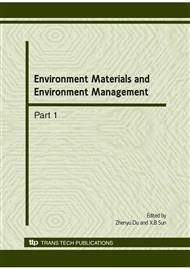[1]
W.J. Guo, Y.X. Wang, A numerical oil spill model based on a hybrid method. Marine Pollution Bulletin, 2009, 58(5): 726-734.
DOI: 10.1016/j.marpolbul.2008.12.015
Google Scholar
[2]
E. Vanem, Ø. Endresen, R. Skjong, Cost-effectiveness criteria for marine oil spill preventive measures. Reliability Engineering & System Safety, 2008, 93(9): 1354-1368.
DOI: 10.1016/j.ress.2007.07.008
Google Scholar
[3]
S. -D. Wang, Y. -M. Shen, Y. -K. Guo, J. Tang, Three-dimensional numerical simulation for transport of oil spills in seas. Ocean Engineering, 2008, 35(5-6): 503-510.
DOI: 10.1016/j.oceaneng.2007.12.001
Google Scholar
[4]
B. Baruque, E. Corchado, A. Mata, J.M. Corchado, A forecasting solution to the oil spill problem based on a hybrid intelligent system. Information Sciences, 2010, 180(10): 2029-(2043).
DOI: 10.1016/j.ins.2009.12.032
Google Scholar
[5]
X. Liu, K.W. Wirtz, Consensus oriented fuzzified decision support for oil spill contingency management. Journal of Hazardous Materials, 2006, 134(1-3): 27-35.
DOI: 10.1016/j.jhazmat.2005.11.012
Google Scholar
[6]
G. Copeland, W. Thiam-Yew, Current data assimilation modelling for oil spill contingency planning. Environmental Modelling & Software, 2006, 21(2): 142-155.
DOI: 10.1016/j.envsoft.2004.04.022
Google Scholar
[7]
W. Kai, X.L. Wirtz, Integrating economy, ecology and uncertainty in an oil-spill DSS: The Prestige accident in Spain, 2002. Estuarine, Coastal and Shelf Science, 2006, 70(4): 525-532.
DOI: 10.1016/j.ecss.2006.06.016
Google Scholar
[8]
F.L. Pincinato, P.S. Riedel, J.C.C. Milanelli, Modelling an expert GIS system based on knowledge to evaluate oil spill environmental sensitivity. Ocean & Coastal Management, 2009, 52(9): 479-486.
DOI: 10.1016/j.ocecoaman.2009.08.003
Google Scholar
[9]
M. Shahriari, A. Frost, Oil spill cleanup cost estimation - Developing a mathematical model for marine environment Process Safety and Environmental Protection, 2008, 86(3): 189-197.
DOI: 10.1016/j.psep.2007.12.001
Google Scholar
[10]
C. Brekke, A.H.S. Solberg, Oil spill detection by satellite remote sensing. Remote Sensing of Environment, 2005, 95(1): 1-13.
DOI: 10.1016/j.rse.2004.11.015
Google Scholar
[11]
P. Sebastião, C.G. Soares, Uncertainty in predictions of oil spill trajectories in open sea. Ocean Engineering, 2007, 34(3-4): 576-584.
DOI: 10.1016/j.oceaneng.2006.01.014
Google Scholar


